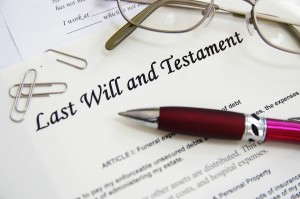 If you are reading this, chances are that you will need an executor and/or will be an executor at some point in your life. An executor is the person named in a will to administrate the estate of the person who died leaving that will. The job of the executor is to make sure that the deceased person’s wishes, as described in the will, are carried out.
If you are reading this, chances are that you will need an executor and/or will be an executor at some point in your life. An executor is the person named in a will to administrate the estate of the person who died leaving that will. The job of the executor is to make sure that the deceased person’s wishes, as described in the will, are carried out.
Here are some of the tasks executors perform:
These tasks can be complex, full of “red tape” and frustrating, so it is important to choose the right person for the job.
A good executor is:
Too often, people making a will choose their executor based on family dynamics or out of a wish to bestow an ‘honor’ on a special person in their life. They give little consideration to the personal traits and skills needed by the executor, with disastrous results. As a professional organizer specializing in finances and paperwork, I have witnessed these horror stories when the wrong person was chosen for the job of executor:
The key take-away from this post is to choose your executor carefully, based on the skills needed to do the job. But perhaps, you have already chosen an executor who lacks some of these skills, and you don’t want to make waves by changing. Or maybe, you have been named as someone’s executor and feel unqualified for the job. In either case, don’t despair, because help is available. Professional organizers can help inventory the deceased person’s possessions, and can help sell and/or donate possessions not inherited by a specific individual. Some organizers specialize in the organizing of finances, paperwork and information, and can help with these aspects of the executor’s job. A good place to find an organizer to help with the administration of an estate is the ‘Find an Organizer’ link at www.napo-gpc.org.
What reaction comes up in you when you hear that phrase? “I’ll think about that someday–in the distant future.” “I’m too young to bother with that stuff.” “That’s for people with problems I don’t have yet—thank God.” “I wouldn’t know where to begin.” “I don’t have any affairs to get in order!”
Do you have children under your care? Are you responsible for an aging relative, in whole or in part? Is there someone with disabilities in your life? Do you feel uneasy when you hear of a catastrophic event happening to someone younger than you? Do you treasure your independence? Do you own a home and/or things that are special to you? Do you do everything legally within your power to minimize your annual income taxes?
If you answered “yes” to even one of these questions, then starting now to get your affairs in order might make sense for you.
We usually associate getting our affairs in order with legal documents and professional experts such as wills, powers of attorney and advance directives, lawyers, accountants and financial planners. While these documents and experts certainly play important roles in your well-ordered affairs, just making a few basic lists yourself can be a useful start:
Still feeling daunted? You might consider enlisting the help of a professional organizer to get your affairs in order. Professional organizers are experts at helping people sort through quantities of papers and objects, separate the important from the inessential, and arrange useful objects and information in systems that are easily accessed and used. Getting your affairs in order is just a process for capturing the essential information about you as a person and what you own, in a form that can be used readily by others if you become unable to communicate, along with legal documents that clearly express how you want yourself and your possessions to be handled. You can do this, and an organizer just might provide you the support you need to get started!